Americans’ negative feelings about politics today and elected officials extend to their views about the quality of the people who run for office and the reasons why they do. For the most part, these feelings don’t differ much across party lines – although dissatisfaction with the choices Americans have in elections is even more widespread among people who don’t identify with either party.
What motivates people to run for office?
Self-interest – whether in the form of making a lot of money, potentially running for a higher-level office later, or gaining fame and attention – is widely seen as the motivating force for all or most elected officials. In contrast, just 15% of Americans think all or most elected officials ran because they wanted to serve the public.
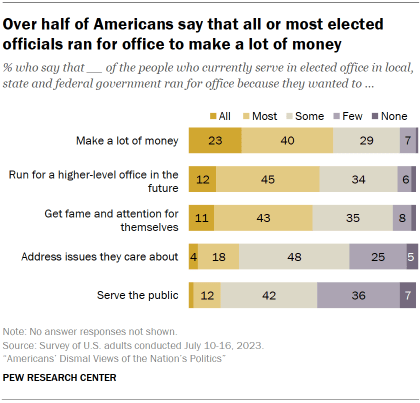
Today, 63% say that all or most elected officials in local, state and federal government ran because they wanted to make a lot of money, while about three-in-ten (29%) say some elected officials ran for this reason. Just 8% of Americans say a desire to make a lot of money motivated few or no elected officials.
Majorities also say all or most officials ran with the intention to run for higher-level office in the future (57%) and to get fame and attention for themselves (54%). No more than one-in-ten say that few or no officials ran for these reasons.
By comparison, 22% say all or most elected officials ran because they wanted to address issues they care about, while about half (48%) say that some elected officials ran for this reason (30% say few or none did).
Just 15% say all or most elected officials ran because they wanted to serve the public, with 43% saying that few or none ran for this reason.
Majorities of both Republicans and Democrats think most politicians run for reasons of self-interest, not public interest
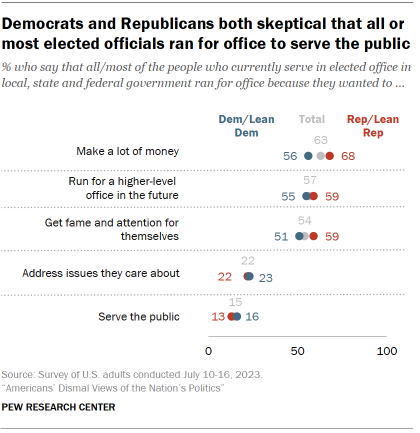
Majorities in both parties say that all or most people currently in office ran because they wanted to make a lot of money, although Republicans and Republican-leaning independents (68%) are more likely to say this than Democrats and Democratic leaners (56%).
Similarly, a narrow majority of Democrats (55%) say all or most elected officials ran because they wanted to run for a higher-level office in the future, and about half (51%) say they ran to get fame and attention for themselves. About six-in-ten Republicans (59% each) say these things motivate all or most elected officials.
In contrast, far smaller shares of both Republicans (22%) and Democrats (23%) say most or all elected officials ran to address issues they care about, and even fewer think serving the public was a motivator for most elected officials (13% for Republicans, 16% for Democrats).
Quality of recent political candidates
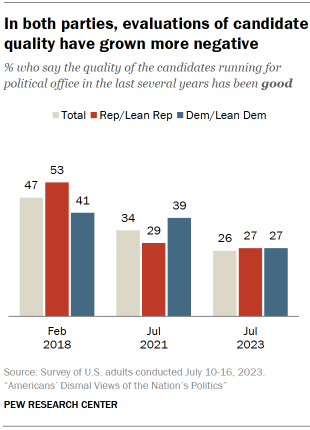
The public expresses generally negative views about the quality of candidates running for political office in the last several years. About a quarter (26%) say the quality of candidates running for office in recent years has been good, while 72% say it has been bad.
Americans’ evaluations of the quality of candidates running for political office have become more negative over the last few years. The share rating the quality of candidates as good is down 8 percentage points since July 2021 and down 21 points from February 2018.
Partisan views about the quality of candidates
Today, similar shares of Republicans and Democrats (27% each) say the quality of candidates has been good in the last several years.
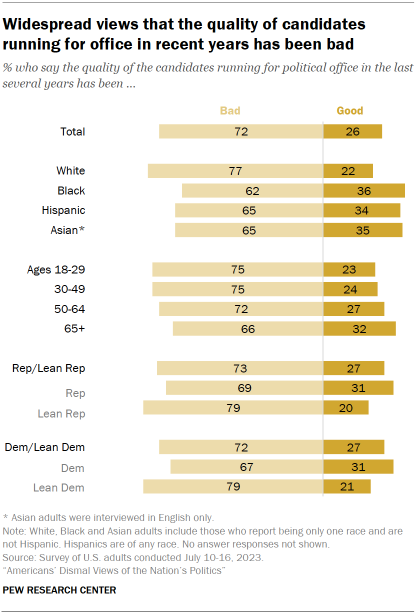
Between 2018 and 2021, Republicans’ views on this measure shifted more negative (from 53% good to 29% good) but are little changed since then.
Democrats’ views shifted little between 2018 and 2021, but are down from 39% in 2021 saying candidate quality has been good to 27% today.
Majorities across the political spectrum now say candidate quality in the last several years has been bad, with no difference in these views by party. However, those who identify as independents but lean toward a party are more negative than people who identify as partisans.
While 79% of Republican leaners say candidate quality has been bad recently, a smaller majority of Republican identifiers (69%) say this. The pattern is nearly identical among Democrats and Democratic leaners.
Views about the quality of political candidates these days vary modestly by age, race and ethnicity
Overall, White Americans are more likely (77%) than Black (62%), Hispanic (65%) or Asian (65%) Americans to say candidate quality has been bad in recent elections.
And those who are 65 and older offer somewhat more positive evaluations of recent candidates (32% rate the quality as good) than those under 65 (25% say this).
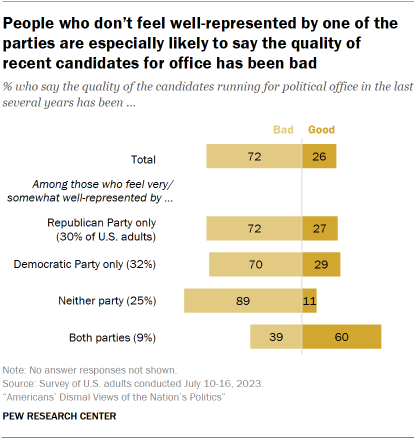
Negative evaluations of the quality of candidates running for political office are particularly pronounced among the quarter of Americans who say they don’t feel well-represented by either of the two major parties: About nine-in-ten (89%) say the quality of candidates in recent years has been bad.
Still, the view that recent candidate quality has been bad is fairly widespread even among those who say they are well-represented by one of the two parties, with about seven-in-ten saying this.
The small share of Americans (just 9%) who feel at least somewhat well-represented by both parties are the only group in which a majority – 60% – say candidate quality has been good in recent years.
In elections, is there usually at least one candidate who shares your views?
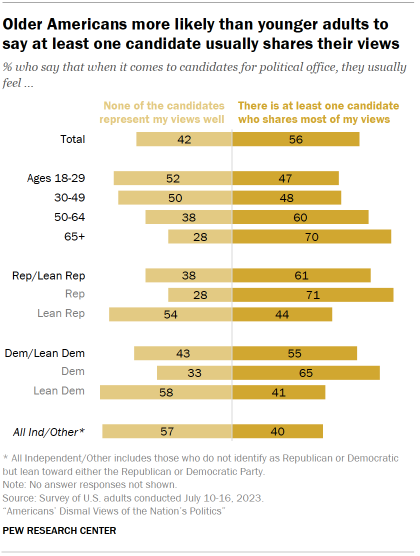
While Americans’ evaluations of the quality of candidates running for political office in recent years are largely negative, a majority (56%) say they usually feel like there is at least one candidate for office who shares most of their views. Still, 42% say it’s usually the case that none of the candidates represent their views well.
There are substantial age differences on this question. Americans younger than 50 are about equally likely to say at least one candidate usually shares most of their views or that none do (47% vs. 51%). Those 50 and older are more likely to say at least one candidate shares their views (65% vs. 33%).
Partisans – both Republicans and Democrats – are more likely than independents and those who identify with another party to say that they typically have a candidate who shares their views. About seven-in-ten Republican identifiers (71%) and 65% of Democratic identifiers say this. By comparison, 40% of independents and those who identify with another party say this – including 44% of Republican leaners and a similar share (41%) of Democratic leaners.
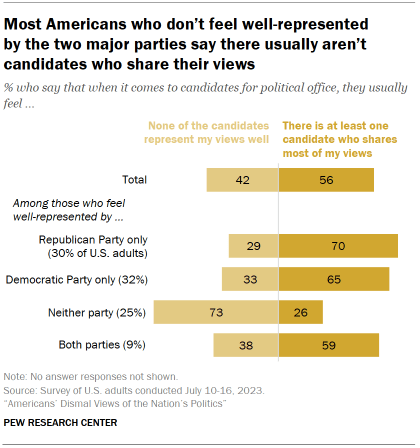
Majorities of those who feel well-represented by one of the two major parties say there is usually at least one candidate who shares most of their views.
Seven-in-ten Americans who feel well-represented by the GOP (but not the Democratic Party) say this, as do 65% of those who feel represented by the Democratic Party only.
About six-in-ten (59%) of those who feel well-represented by both parties say at least one candidate typically shares their views.
In contrast, just 26% of those who do not feel well-represented by either party say that there is usually at least one candidate who shares most of their views.
What the public sees as most important in political candidates
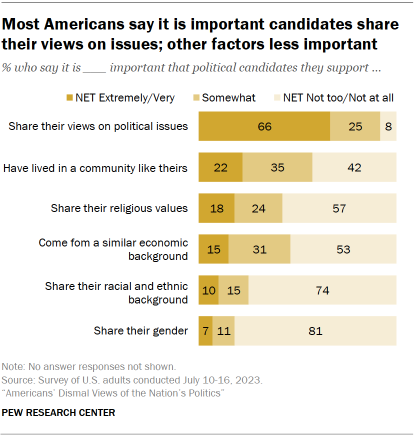
When asked about important characteristics of political candidates they support, Americans overwhelmingly point to the importance of candidates sharing their views on issues, with other qualities mattering less.
About two-thirds of adults (66%) say it is extremely or very important that political candidates share their views on political issues, while fewer than one-in-ten (8%) say this is not too or not at all important.
Other qualities matter far less: About two-in-ten say it is extremely or very important that candidates have lived in a community like theirs (22%) or share their religious values (18%), while 15% say the same about coming from a similar economic background.
One-in-ten say it is extremely or very important that political candidates share their racial and ethnic background, with just 7% saying the same about sharing their gender.
The importance of these characteristics varies across demographic groups. For instance, a quarter of Black adults say that it is extremely or very important to them that candidates they support share their racial and ethnic background. By comparison, 17% of Hispanic adults, 16% of Asian adults and just 5% of White adults say the same. Still, across demographic groups, shared views on political issues consistently ranks as the most important quality.




